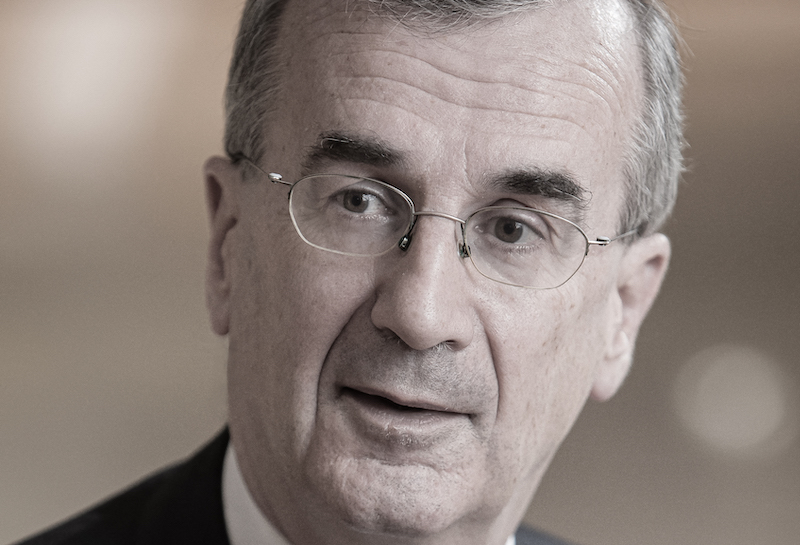Listen to the brightest minds in the field of economics and development discuss their latest research and deconstruct global economic trends. IMF Podcasts are also available on other digital platforms such as Spotify, SoundCloud, Libsyn, and free to use for broadcasters, educators and institutions.
A Sustainable Future: Ratna Sahay on Mainstreaming Gender
September 29, 2022

On A Sustainable Future podcast, Ratna Sahay says the new IMF gender strategy applies a gender lens to macroeconomic and financial policymaking. (IMF photo)
How can multilateral institutions like the IMF help close the gender gap? IMF Senior Advisor on Gender, Dr. Ratna Sahay joins Jason Mitchell, Head of Responsible Investment Research at Man Group, on their A Sustainable Future podcast to talk about how gender disparities hurt economic growth. Dr. Sahay has been a gender equality pioneer over the years- helping to break down barriers within her own institution. She now heads the IMF's first strategy toward mainstreaming gender into its core work. Transcript
Check out more episodes of A Sustainable Future podcast.
Ratna Sahay is IMF Senior Advisor on Gender.
Jason Mitchell is Head of Responsible Investment Research at Man Group and Host of A Sustainable Future podcast.
François Villeroy de Galhau on the Ethics of Currency
September 22, 2022

François Villeroy de Galhau presented the 2022 Michel Camdessus Central Banking Lecture. (photo: Banque de France)
The Michel Camdessus Central Banking Lecture is an annual event honoring the IMF's longest-serving Managing Director. This year's lecture was presented by François Villeroy de Galhau, Governor of the Banque De France, and introduced by IMF Managing Director Kristalina Georgieva. In his lecture, Governor de Galhau says today's multiple crises are challenging public trust in central banks. Transcript
Go to IMF.org to watch the webcast of the entire event including a post-lecture discussion.
François Villeroy de Galhau is Governor of the Banque De France.
Kristalina Georgieva is IMF Managing Director.
Carlo Pizzinelli on How Consumers Chart Inflation
September 8, 2022

Carlo Pizzinelli says a better understanding of how consumers think helps policymakers better control inflation. (IMF photo)
While consumers' expectations of where prices are going are something that economists have been tracking for a long time, understanding how those expectations are formed provides valuable insight toward controlling inflation. New research by economists Carlo Pizzinelli (IMF), Peter Andre (Briq Institute), Christopher Roth (University of Cologne), and Johannes Wohlfart (University of Copenhagen) shows a surprising divide between what experts think and consumers believe drives inflation and other economic trends. Carlo Pizzinelli is the author of an article in the latest Finance and Development based on the study. In this podcast, Pizzinelli sits down with Journalist Rhoda Metcalfe to discuss how the collective consumer mind influences economic policy. Transcript
Carlo Pizzinelli is an economist in the IMF Research Department.
May Khamis on Financial Stability Assessment Programs
August 30, 2022

Fintech Forward podcast series zeros in on all things Fintech.
Welcome to the 5th and final episode of Fintech Forward, the IMF podcast that focuses on financial technology. Hosted by IMF economist Tara Iyer, the special 5-part series draws from the expertise of the IMF Monetary and Capital Markets Department (MCM) to better understand the impact of emerging technologies on financial systems and local economies around the world. In this podcast, MCM's May Khamis talks about how the IMF's Financial Stability Assessment Programs, which started in the early 2000s, are adapting to the rapid rise of FinTech. Transcript
May Khamis is a Deputy Director, and Tara Iyer is an economist in the IMF Monetary and Capital Markets Department.
Nicholas Mulder on Sanctions as a Weapon
August 30, 2022

Nicholas Mulder says Sanctions can have far greater effects on the global economy than ever before. (photo: Cornell University)
Sanctions are not new, but they deliver bigger global shocks and are easier to avoid than at any time in history. Nicholas Mulder's latest book, The Economic Weapon, the Rise of Sanctions as a Tool of Modern War, looks at sanctions regimes of the past to better understand the implications of today's sweeping sanctions against Russia. In this podcast, Mulder says we need to think more carefully about crafting macroeconomic policy at a global level to offset the negative effects that the sanctions are having on third countries. Transcript
Read the article in Finance and Development
Nicholas Mulder is an assistant professor of history at Cornell University,


